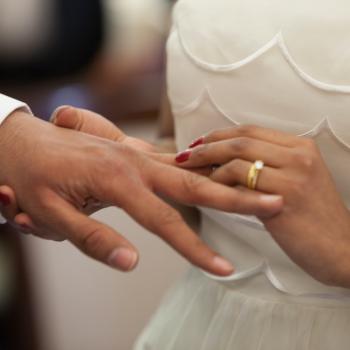Is it really the case that there is a "new wave" of Mormon feminism? Since the 1960s, every generation as it has come of age has discovered feminism as if it's new. This time around, due to the personal marketing available via social networking sites and the broad connectivity of the Mormon blogging community, women can easily participate in the 21st century's version of feminist consciousness-raising groups. My own ethnographic work on Mormon women in the last few years bears out the observation that LDS women increasingly self-identify as feminists.
What does it mean when a Mormon woman claims to be a feminist? What does it do for her? How does this category function in Mormon culture, and is it an identity available equally for every Mormon woman to claim? Although Kathryn is right that some Mormons are "squeamish about" and even "spooked by" feminism, I would suggest that among educated, white, Mormon women of a certain socioeconomic class and age, it is actually very fashionable to self-identify as a feminist. It is a form of signaling to others that despite your membership in a patriarchal church where women wield no administrative decision-making power, you're neither blind nor resigned to gender inequities. You're not duped and don't deserve the media's scorn.
As counterintuitive as it seems, having feminist credentials is a source of social capital among a certain demographic of Mormon women. This is the genius behind the "Feminist Mormon Housewives" blog. Claiming feminism loudly allows its contributors and readers to own their Mormonism and domesticity proudly, more so than they might otherwise. If your feminism is non-political, non-activist, and thus, non-threatening, it can be a way of marking yourself as hip, sophisticated, and even a little subversive without really risking anything (especially if you post and comment anonymously, as has been standard practice for many bloggers at FMH).
Importantly, however, it seems to be the case that Mormon feminism is most easily tolerated if a woman meets other LDS cultural standards. The Mormon women who are most likely to self-identify as feminist, and who have the most luck accruing the social capital it can offer, are women who, in all other ways, walk the walk of faithful Mormon womanhood, especially regarding marriage and motherhood. It seems to be most acceptable to claim a label that inherently opposes patriarchy as long as you submit to patriarchy in practice.
The three-month-old grass-roots organization, WAVE, epitomizes these points. WAVE explicitly identifies itself as "feminist," by virtue of a stated commitment to gender equality, but also asserts that being feminist and faithful are not mutually exclusive. The website indicates that WAVE hopes to "make changes to policy and practice that do not require doctrinal variation" and that its primary purpose is to "uplift," and "support" women. Such a gentle, almost pastoral Mormon feminism seems unlikely to evoke outrage or result in ecclesiastical discipline. No doubt, this gradual, incrementalist approach to increased gender equality in the church has strategic advantages compared with outright defiance of church leadership, but as it is described, one wonders what concrete goals the organization hopes to achieve.
Furthermore, the dubious assumption that gender inequality in the church is primarily a policy issue and not a doctrinal one comes across as wishful thinking. It seems likely that WAVE will ultimately find itself committed either to a loose version of "faithful" or to certain compromises of equality. As Kathryn ably points out, "the issue of primacy is unavoidable for those who are Mormon and feminist." If WAVE's first commitment is to the church, where exactly will it compromise on equality? If WAVE's first commitment is to gender equality, where will it draw the line with the church? WAVE seems unaware of the inevitable impasse, as though it will somehow, inexplicably, get right what earlier Mormon feminists got wrong.
The women who constitute the WAVE board are among those who are basically comfortable in and with the church. In fact, in many ways they represent the standard picture of ideal Mormon womanhood, though they are hardly representative of LDS women as a whole. They all share nearly identical social locations. They are overwhelmingly white, in their 20s and 30s, highly educated, married or engaged, and nearly all are mothers. They do not seem to be among those who feel deeply damaged by patriarchy, even though many other Mormon women do. I would argue that their privileged social location plays a role in their ability to claim a feminist identity. Older women without children, women of color, divorcees, never marrieds, adult converts, less actives, lesbians, and other women who inhabit less socially privileged space in LDS culture might not feel sufficiently authorized or institutionally secure enough to risk taking on a feminist identity since the costs to them of challenging the patriarchy are potentially much greater. At least so far then, the new Mormon feminism seems to be a movement with very constrained parameters.
I applaud efforts to organize, to study, to teach, and to write about the issues Mormon women face, and to increase their visibility. I support conversations with and about women in public spaces and defend the opportunity for women to name their own experience. These are empowering actions, conducive of community, and profoundly psychologically comforting. Blog posts, cyber chatting and virtual therapy have an important pastoral function, but we also need to be clear about their limitations.
For more responses to Kathryn Soper's As Sisters in Zion, click here.
12/1/2010 5:00:00 AM




